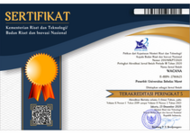Terapi Realitas untuk Membantu Santri Mengembangkan Self-Motivational Belief yang Positif
Abstract
Like educational institutions in general, pesantren cannot provide a 100% guarantee that santri will not take actions that violate the values held in pesantren. Some of them took actions of included juvenile delinquency with varying levels of seriousness. This is because the behavior of santri is not only about religious knowledge, but is also influenced by other variables, one of which is internal factors such as self-regulation abilities. According to the social-cognitive perspective, the process of self-regulation and accompanying beliefs occurs in a cycle in which there are three phases, namely: forethought, performance or volitional control, and self-reflection. One part of forethought is self-motivational belief, a self-related belief that can affect the effectiveness of a person's self-regulation process. This study is a single case study that raises the case of a santri who is committed several violations and was indicated to have negative self-motivational beliefs. The subject received 10 sessions of reality therapy for improving his self-regulation ability, as santri in pesantren and as a student in his school. After receiving reality therapy, the self-motivational beliefs developed by the subject became more positive. Two months after completion of therapy, the subject showed enthusiasm in learning at the pesantren even though his academic abilities were not as good as other friends and showed better adaptation to the rules of the pesantren.
Keywords
Full Text:
PDF (Bahasa Indonesia)References
Al-Fairuzzabadi, A. G. (2014). Pengaruh regulasi diri terhadap delinquency santri MTs Pondok Pesantren Al-Mu’minien Lohbener. Skripsi. UIN Malik Ibrahim: Malang. Retrieved from: http://etheses.uin-malang.ac.id/1661/12/10410184_Ringkasan.pdf
Aminatuzzuhriyah. (2010). Kenakalan remaja di pondok pesantren (studi deskriptif tentang persepsi kenakalan remaja bagi santri, alasan dan bentuk-bentuk kenakalan remaja di pondok pesantren. Skripsi. Universitas Airlangga: Surabaya. Retrieved from: https://repository.unair.ac.id/16871/1/gdlhub-gdl-s1-2011-aminatuzzu-21112-fiss.2-k.pdf Cleary, T. J.,
Zimmerman, B. J. (2004). Self-regulation empowerment program; A school-based program to enhance self-regulated and self-motivated cycles of student learning. Psychology in the Schools, 41(5), 537-550. Retrieved from: https://psycnet.apa.org/doi/10.1002/pits.10177
Corey, G. (2017). Theory and practice of counselling and psychotherapy. Cengage Learning.
Frias-Armenta, M., Borrani, J., Valdez, P., Tirado, H., Jimenez, X. O. (2012). Self-control, self-regulation, and juvenile delinquency. Dalam V. Barkoukis (ed). Psychology of Self-Regulation: Psychology of EMotions, Motivations, and Actions. Nova Science Publisher. Retrieved from: https://www.researchgate.net/publication/281925674_Self-control_self-regulation_and_juvenile_delinquency Hajhosseini, M., Gholamali-Lavasani,
M., & Beheshti, M. R. (2016). Effectiveness of Group Counseling based on Reality Therapy on Academic Procrastination and Behavioral Self-Regulation of Students. Int J Behav Sci, 10(4), 167-172. Retrieved from: http://www.behavsci.ir/article_67954.html
Gillebaart, M. (2018). The 'operational' definition of self-control. Frontiers in Psychology, 9, 1-5. https://doi.org/10.3389/fpsyg.2018.01231
Mulawarman, Sunawan, S., Amin, Z. N. (2018). The effectiveness of reality therapy for decreasing self-motivation problems of lower group students. Advances in Social Science, Education, and Humanities Research, 173, 242-24. https://dx.doi.org/10.2991/icei-17.2018.63 Nudin, M. I.,
Abdurakhman, O., & Indra, S. (2020). Motivasi orang tua memilih pesantren sebagai sarana pendidikan. E-Journal Skripsi: Fakultas Keguruan Dan Ilmu Pendidikan, 3(1), 1–16. Retrieved from: https://ojs.unida.ac.id/skripsiunida/article/view/2609/1720
Nuzul, P. L., Amin, A. (2021). Pengaruh regulasi diri terhadap kenakalan remaja. Jurnal Psikologi: Jurnal Ilmiah Fakultas Psikologi Universitas Yudharta Pasuruan, 8(1), 67-77. https://doi.org/10.35891/jip.v8i1.2650
Rahmatullah, A. S., Purnomo, H. (2020). Kenakalan remaja kaum santri di pesantren (telaah deskriptif-fenomenologis). Ta'allum: Jurnal Pendidikan Islam, 8(2), 222-245. https://doi.org/10.21274/taalum.2020.8.2.222-245
Rozi, F. (2020). Motivasi orang tua menyekolahkan anak di pondok pesantren: Studi di Dusun Lendang Guar Barat Da Kedaro Kecamatan Sekotong Kabupaten Lombok Barat. Skripsi. UIN Mataram: Mataram. Retrieved from: http://etheses.uinmataram.ac.id/294/1/Fahrul%20Rozi%20160101223.pdf
Silvia, S. (2019). Eksistensi kompetensi kepribadian guru dan karakter santri. Tesis. UIN Sulthan Thaha Saifuddin: Jambi. Retrieved from: http://repository.uinjambi.ac.id/2199/1/TESIS_SELLA%20SILVIA_MPA.172670%20%28BOOKMARK%29%20-%20Tsaqiif%20Naufal.pdf
Zimmerman, B. J. (2000). Attaining self-regulation: A social cognitive perspective. In M. Boekaerts, P. R. Pintrich, & M. Zeidner (Eds.). Handbook of Self-Regulation (pp. 13–39). Academic Press.
DOI: https://doi.org/10.20961/wacana.v15i1.60372
Refbacks
- There are currently no refbacks.
Copyright (c) 2023 Fatin Philia Hikmah, Veronika Suprapti

This work is licensed under a Creative Commons Attribution-ShareAlike 4.0 International License.
Jurnal WACANA
Fakultas Psikologi Universitas Sebelas Maret (UNS)
Gedung D Fakultas Psikologi
Jl. Ir. Sutami 36A Kentingan, Jebres, Surakarta Jawa Tengah 57126
email : wacana@mail.uns.ac.id






